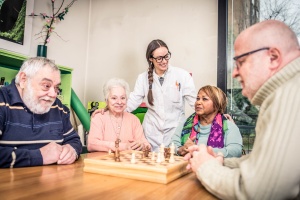 A brand new research performed throughout 5 European international locations is the biggest randomized managed trial ever finished to see how efficient a mixed listening to and imaginative and prescient rehabilitation program may be for folks with dementia residing at dwelling. This research, led by specialists from Trinity School and the International Mind Well being Institute (GBHI), has been printed in The Lancet Wholesome Longevity journal.
A brand new research performed throughout 5 European international locations is the biggest randomized managed trial ever finished to see how efficient a mixed listening to and imaginative and prescient rehabilitation program may be for folks with dementia residing at dwelling. This research, led by specialists from Trinity School and the International Mind Well being Institute (GBHI), has been printed in The Lancet Wholesome Longevity journal.
The SENSE-Cog trial factors out the vital significance of addressing each listening to and imaginative and prescient well being in folks with dementia. It exhibits that caring for listening to and imaginative and prescient issues can enhance their high quality of life, no less than within the brief time period.
The analysis was a randomized managed trial, which suggests contributors have been randomly assigned to both obtain the intervention or not. It included folks with delicate to average dementia from 5 totally different European international locations: Cyprus, France, Greece, Eire, and the UK. The principle purpose was to see how a lot a particular program known as Sensory Help Intervention (SSI), which targeted on bettering listening to and imaginative and prescient, might have an effect on the standard of life and different well being outcomes in folks scuffling with dementia and sensory points.
The intervention outcomes confirmed that contributors’ high quality of life improved within the brief time period after receiving the listening to and imaginative and prescient rehabilitation. Nonetheless, over the long term, the distinction between those that obtained the intervention and people who didn’t grew to become much less noticeable, suggesting that additional analysis is required. The research additionally emphasised that listening to and imaginative and prescient issues are frequent in folks with dementia, with as much as 70% of them experiencing these points. If these issues aren’t addressed, they’ll worsen dementia signs and scale back total well-being.
There have been only a few research like this that take a look at non-drug therapies for dementia, particularly throughout totally different international locations with various languages and healthcare techniques. As Europe will get able to introduce new therapies that focus on amyloid (a protein related to Alzheimer’s illness), the research’s findings remind us that non-drug interventions stay essential, particularly for folks with extra superior phases of dementia or sorts of dementia aside from Alzheimer’s, who may not profit from these new therapies.
The lead researcher, Professor Iracema Leroi from Trinity School Dublin, defined that the outcomes are promising as a result of they present that straightforward, low-cost interventions like offering listening to aids or glasses might enhance the standard of life for folks with dementia. Leroi believes that these sorts of non-drug therapies ought to proceed to be studied and supported as essential areas of dementia care.
Moreover, Leroi confused the necessity to deal with the standard of life for folks residing with dementia. With a lot consideration being given to therapies that attempt to forestall or decelerate dementia, she highlighted the significance of additionally specializing in serving to the 55 million individuals who have already got dementia to stay properly.
Professor Brian Lawlor, additionally from Trinity School Dublin, added that listening to and imaginative and prescient issues are an enormous situation for folks with dementia that always goes unnoticed. He famous that this research was the primary large-scale try to see if bettering listening to and imaginative and prescient might make a distinction within the lives of individuals with dementia. The truth that it was attainable to run this research even throughout the COVID-19 pandemic exhibits how a lot potential such a intervention has. Lawlor emphasised that the early indicators of improved high quality of life recommend that extra analysis is required.
This research offers one of the best proof to date that these interventions can enhance their high quality of life within the brief time period. Nonetheless, the analysis group believes that extra proof is required to know the consequences on different essential components like cognition, habits, and the position of household caregivers.
The research requires ongoing efforts to develop and enhance non-drug therapies that tackle the complicated wants of individuals with dementia. It suggests a extra holistic strategy to their care is important to help their well-being.

